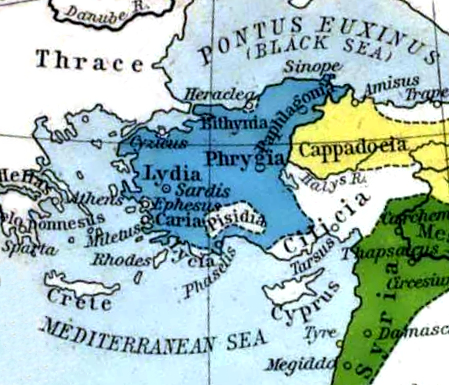What and who is…
Lydia
Greek: Λυδία
Romanized as Lȳdiā (Lydia)
also known as: Lud, Ludia
This was the name of a biblical kingdom and a godly woman.
-
Lydia (aka Lud), a kingdom in western Asia Minor
Hebrew: לוּד —transliteration: Lud
This kingdom derived its name from Lud the 4th son of Shem, son of Noah (Genesis 10:22; 1 Chronicles 1:17).
“Mizraim became the father of [the people groups] Ludim and Anamim and Lehabim and Naphtuhim” —Genesis 10:13 NASB
This place is also mentioned by the prophets Isaiah and Ezekiel.
“I will set a sign among them and will send survivors from them to the nations: Tarshish, Put, Lud, Meshech, Tubal and Javan…” —Isaiah 66:19a NASB
“Persia and Lud and Put were in your army, your men of war…” —Ezekiel 27:10a; 30:5
“Ethiopia, Put, Lud, all Arabia, Libya and the people of the land that is in league will fall with them by the sword.” —Ezekiel 30:5 NASB
The people of this place were called Lydians or Ludim (Hebrew: לוּדִי)—Jeremiah 46:9.
It is mentioned in Ezekiel 30:5. It was bounded on the east by the greater Phrygia, and on the west by Ionia and the Aegean Sea.
 Lydian Empire, 600 B.C.
Lydian Empire, 600 B.C.The earliest coins come from Lydia.
The historian Herodotus reported that the Lydians were the first to establish permanent retail shops and mint coins of gold and silver.
Language: Lydian—related to Luwian and Hittite.
During the Roman conquest era, Lydia became a Roman province. Lydia’s capital was Sardis.
-
Lydia, a godly business woman of Thyatira
Greek: Λυδία —transliteration: Ludia
She was a “seller of purple,” who lived in Philippi and met Paul (Acts 16:14-15).
She was not a Jewess but a proselyte. The Lord opened her heart as she heard the Gospel from the lips of Paul (16:13).
She thus became the first in Europe who embraced Christianity. She was a person apparently of considerable wealth, for she could afford to give a home to Paul and his companions.
More information
- Lud
- Ludim
- Who is Shem?
- Biblical women with admirable character, include: Mrs. Noah, Mary (mother of Jesus), Esther, Deborah, and Milcah, daugher of Zelophehad
- Women of the Bible
- Thyatira
- Philippi of Thrace
- Turkey
- Who is Paul?
- Coins of the Bible